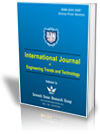Traffic Safety Analysis for Minorities in Urban and Rural Regions
Citation
MLA Style: Panos D. Prevedouros "Traffic Safety Analysis for Minorities in Urban and Rural Regions" International Journal of Engineering Trends and Technology (2020):10-15.
APA Style:Panos D. Prevedouros. Traffic Safety Analysis for Minorities in Urban and Rural Regions International Journal of Engineering Trends and Technology, 10-15.
Abstract
CSET is a consortium of four participating state universities—Alaska, Hawaii, Idaho, and Washington—conducting research and technology transfer on transportation safety equity with emphasis on rural, isolated, and minority communities. Data for this comparative study were collected from the Fatality Analysis and Reporting System (FARS) for the years 2007 to 2016 for the states of Alaska, Hawaii, Idaho, and Washington. OECD safety statistics suggests that these states are lagging behind many countries in terms of traffic safety. All four CSET states vary considerably in terms of total population, minority population, vehicle miles of travel, and traffic fatalities. The traffic fatality analysis showed that most of the major findings for each state are different. Common safety issues include young driver safety, speeding, impaired driving and rural enforcement. Major recommendations include a detailed causality analysis leading to programs for pedestrian safety among CSET fatalities; Enforcement and educational programs relating to high-speed driving in rural areas; and, additional emphasis in rural area enforcement.
Reference
[1] University of Alaska Fairbanks, (2020) “Center for Safety Equity in Transportation”, CSET, cset.uaf.edu
[2] Prevedouros, Panos D., Kishor Bhatta and M. Mintu Miah, (2019) “2007–2016 Fatal Traffic Crashes in Alaska, Hawaii, Idaho, and Washington and Characteristics of Traffic Fatalities Involving Hawaiians and CSET Minorities”, Final report prepared for CSET and the U.S. DOT, INE/CSET 19.06, 93 pp., http://cset.uaf.edu/media/222366/ 1702_cset_final_report_panos.pdf
[3] NHTSA, (2020), “Fatality Analysis Reporting System”, FARS, https://www.nhtsa.gov/research-data/fatality-analysis-reportingsystem- fars
[4] OECD, (2018) “International Road Safety Annual Report 2018”, https://www.itf-oecd.org/sites/ default/files/docs/irtad-road-safety-annual-report-2018_2.pdf
[5] Siddiqui, C., Abdel-Aty, M. and Choi, K., 2014. “Implications of pedestrian safety planning factors in areas with minority and low-income populations”. International journal of sustainable transportation, 8(5), pp.360-381.
[6] Probst, J.C., Laditka, S.B., Wang, J.Y. and Johnson, A.O., 2007. “Effects of residence and race on burden of travel for care: cross sectional analysis of the 2001 US National Household Travel Survey”. BMC health services research, 7(1), p.40.
[7] Pratt, G.C., Vadali, M.L., Kvale, D.L. and Ellickson, K.M., 2015. “Traffic, air pollution, minority and socio-economic status: addressing inequities in exposure and risk”. International journal of environmental research and public health, 12(5), pp.5355-5372.
[8] Mueller, K.J., Ortega, S.T., Parker, K., Patil, K. and Askenazi, A., 1999. “Health status and access to care among rural minorities”. Journal of health care for the poor and underserved, 10(2), pp.230-249.
[9] Ewing, R., Schieber, R.A. and Zegeer, C.V., 2003. “Urban sprawl as a risk factor in motor vehicle occupant and pedestrian fatalities”. American journal of public health, 93(9), pp.1541-1545.
[10] Najaf, P., Isaai, M.T., Lavasani, M. and Thill, J.C., 2017. “Evaluating traffic safety policies for developing countries based on equity considerations”. Journal of Transportation Safety & Security, 9(sup1), pp.178-203.
[11] Whitener, L.A., 2000. “Housing poverty in rural areas greater for racial and ethnic minorities”. Rural America/Rural Development Perspectives, 15(2221-2019-2433), pp.2-9.
Keywords
Alcohol, CSET, FARS, Minority, Restraints, Traffic Safety, Speed, Rural.



